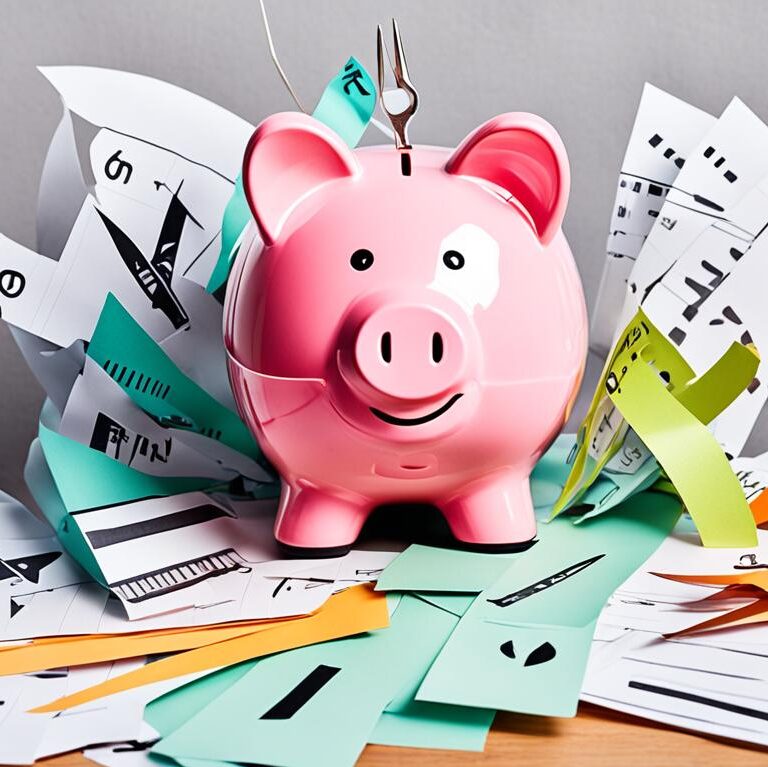“As an Amazon Associate I earn from qualifying purchases.”
When economic uncertainty looms, it can be unsettling. The idea of a recession might worry you. But, with smart financial planning, you can navigate through it without trouble.
Imagine you’re at the helm of your financial ship, navigating rough waters. Stay calm and make wise choices. By cutting costs and optimizing your budget, you can prepare for tough times.
Recessions are short-lived, like seasons. They come and go. Your task is to prepare for winter while it’s still fall. This means saving more, cutting unnecessary costs, and boosting your savings. It’s challenging, but it’s crucial.
Let’s explore some practical tips for saving during a downturn. These strategies aim to make your money work smarter for you. Are you ready to take charge of your financial future? Let’s begin!
Key Takeaways
- Recessions affect the economy, leading to slower production and increased unemployment.
- Spend less than you earn to maximize savings during tough times.
- Maintain minimum debt payments to avoid costly fees.
- Build an emergency fund covering 3-6 months of expenses.
- Use high-yield savings accounts to maximize interest earnings.
- Consider the 50/30/20 rule for efficient budget management.
- Reevaluate and adjust financial goals to focus on saving and debt repayment.
Understanding Economic Downturns and Their Impact on Personal Finances
Economic downturns can really shake up your finances. They bring a lot of uncertainty and have a big impact on your money. It’s important to know the signs of a recession to get through these hard times.
Defining Economic Downturns and Recessions
An economic downturn means the economy is slowing down. A recession is even worse, with two quarters of falling GDP. You might see more job losses, less money coming in, and unstable markets.
How Downturns Affect Individual Financial Situations
When the economy is down, it can hit your wallet hard. Losing a job or working less can make it tough to stick to your budget. You might start paying late on credit cards, which can cost you about $300 a year in extra fees. The ups and downs of the market can also hurt your investments and retirement savings.
The Importance of Proactive Financial Planning
Being ready is key. Experts say you should save enough money to cover three months of expenses. Some even suggest saving up to two years’ worth in easy-to-access accounts. This safety net can help you get by during long job searches or times when you’re earning less.
“Investing time and resources in regular upkeep can prevent major financial disruptions later on.”
Planning ahead also means checking your insurance, taking care of your assets, and finding ways to make more money. These steps can make you more financially stable during uncertain times.
Setting Realistic Savings Goals During Tough Times
When the economy is down, it’s key to set achievable savings goals. Inflation can reduce what your money buys, so it’s smart to adjust your financial plans. A good strategy is to save for now and invest in things like real estate and stocks to fight inflation.
First, make sure you have an emergency fund. Experts say to save enough money to cover three months of your salary. This fund helps you feel secure, especially since 56% of Americans worry about their emergency savings.

- Utilize online high-interest savings accounts for better passive income
- Adjust your investment portfolio based on economic trends
- Reduce recurring expenses and adopt a stricter budget
- Set clear, visualized savings goals to stay motivated
Being consistent is important. Even small savings can add up over time. If you have a steady job, think about saving more. As the economy changes, be ready to update your savings plans.
| Savings Goal | Recommended Amount | Purpose |
|---|---|---|
| Emergency Fund | 3-6 months of expenses | Unexpected costs or income loss |
| Retirement | 15-20% of income | Long-term financial security |
| Short-term Goals | Variable | Specific purchases or events |
By aiming for realistic savings goals and sticking to them, you can grow your financial strength, even when times are hard. Every dollar you save moves you closer to financial stability.
Maximizing Savings in a Downturn: Essential Strategies
Economic downturns can be tough, but they also offer chances to boost your savings. Let’s look at key strategies to save more during hard times.
Revisiting and Adjusting Your Savings Targets
When times get tough, it’s important to check your savings goals. A Schwab survey showed that people close to retirement with over $1 million saved often change their plans. For instance, a couple making $300,000 a year might aim to save $4.5 million for retirement. Look at your current finances and adjust your goals as needed.
Creating a Dedicated Emergency Fund
Having a strong emergency fund is key to staying financially stable. Try to save three to six months of expenses in easy-to-get accounts. High-yield savings or money market accounts are great for your emergency cash. This fund can give you peace of mind when things are uncertain.
Prioritizing High-Interest Debt Repayment
Managing your expenses well means paying off high-interest debt first. Work on clearing credit card balances and other high-interest loans. Think about using balance transfer credit cards with 0% introductory APR to manage your debt better. This can cut down your interest payments and help you save more.
| Strategy | Benefit | Action Step |
|---|---|---|
| Adjust Savings Targets | Realistic financial planning | Review and modify savings goals |
| Emergency Fund | Financial security | Save 3-6 months of expenses |
| Debt Repayment | Reduced interest payments | Focus on high-interest debts |
By using these strategies, you can improve your financial strength and handle economic downturns better. Keep a balance between saving now and planning for the future as you work towards a more secure financial life.
Cutting Expenses: Identifying Areas for Potential Savings

In tough economic times, cutting expenses is key. You need to find where you can spend less without giving up what you need. Start by checking your regular bills and deciding what you really need versus what you don’t.
Look closely at your must-have expenses like rent, utilities, food, and healthcare. These are essential, but you might be able to save a bit. For instance, try negotiating a better deal on your phone or cable. Or use apps like GasBuddy to find cheaper gas, saving money on getting around.
Then, focus on what you spend money on that you don’t really need. This is where you can save the most. Check your subscriptions and memberships. Are you still using everything you pay for? Cancel any services you don’t use. Instead of expensive outings, try free community events or movie nights at home.
- Evaluate recurring expenses
- Negotiate bills for services
- Use apps to find better deals
- Review and cancel unused subscriptions
- Find alternatives to expensive entertainment
Small changes can lead to big savings over time. By cutting costs smartly and watching your spending, you can make your money go further when times are tough.
| Expense Category | Potential Savings | Action Items |
|---|---|---|
| Utilities | 5-15% | Negotiate rates, use energy-efficient appliances |
| Transportation | 10-20% | Use gas price apps, combine errands |
| Subscriptions | 30-50% | Cancel unused services, opt for cheaper plans |
By using these tips, you could cut your spending by 9-15%. This lets you keep up with what you really need while saving on what you don’t. It helps you handle money challenges better.
Smart Budgeting Techniques for Economic Uncertainty
When the economy is shaky, knowing how to budget smart is key. Using the right budgeting strategies and tools can help you stay on top of your finances.
The 50/30/20 Budgeting Rule
The 50/30/20 rule is a great way to budget. It splits your income into three parts:
- 50% for essential needs (housing, food, utilities)
- 30% for wants (entertainment, dining out)
- 20% for savings and debt repayment
This method makes sure you have enough for basics and still enjoy life. It also helps you save for the future.
Digital Tools for Expense Tracking
Use technology to make budgeting easier. Financial planning tools and apps like Rocket Money can track your spending. They help you cancel subscriptions and negotiate bills.
Building Flexibility into Your Budget
With the economy in flux, your budget should be flexible. Save some money for surprises or changes in income. Check and adjust your budget often to keep up with the economy.
| Budget Category | Percentage | Flexibility Tips |
|---|---|---|
| Needs | 50% | Seek better deals on essentials |
| Wants | 30% | Cut back during lean times |
| Savings/Debt | 20% | Increase when possible |
By using these smart budgeting tips, you’ll be ready for financial ups and downs. You’ll keep your finances stable, even when the economy is shaky.
Leveraging High-Yield Savings Accounts and Investment Opportunities
When the economy is down, keeping your wealth safe is key. High-yield savings accounts are a safe way to grow your money. These accounts, found at online banks, usually have higher interest rates than traditional banks. For instance, some Small Finance Banks offer rates that beat inflation.
Investment plans should change with the market. In a 2022 BlackRock survey, 45% of millennials put more money into stocks after the COVID recession. Yet, it’s wise to recall that many portfolios lost 30% or more in value during the Great Recession.
To keep your wealth safe, consider these tips:
- Diversify investments across different asset classes
- Explore ETFs for short market exposure
- Use hedging strategies like protective puts or covered calls
High-yield savings accounts don’t go up and down with the market, making them a steady choice in tough times. They’re perfect for emergency funds and short-term savings goals. When picking an account, look at interest rates, fees, and the minimum balance needed.
“In times of economic uncertainty, a balanced approach to savings and investments can help safeguard your financial future.”
By mixing high-yield savings with smart investment plans, you can aim to keep and grow your wealth, even when the economy is tough.
Diversifying Income Streams to Boost Savings Potential
In uncertain economic times, income diversification is key. By looking at different ways to make money, you can keep your finances safe and grow your savings.
Exploring Side Hustles and Freelance Opportunities
Side jobs are a smart way to add to your main income. The gig economy offers flexible jobs through platforms like Uber, TaskRabbit, or Fiverr. These jobs let you make extra money with little commitment.
Monetizing Skills and Hobbies
Make money from your skills. You can teach classes, create digital products, or sell items on Etsy. This way, you earn money and feel fulfilled.
Considering Passive Income Sources
Passive income means making money with little effort. Here are some options:
- Rental properties
- Dividend-paying stocks
- Peer-to-peer lending
- Digital product sales (ebooks, online courses)
These can greatly improve your financial stability and help you reach your savings goals.
| Income Stream | Effort Level | Potential Return |
|---|---|---|
| Side Gigs | High | Immediate |
| Skill Monetization | Medium | Variable |
| Passive Income | Low | Long-term |
Diversifying your income creates a safety net against losing your job or economic downturns. This approach not only increases your savings but also speeds up building wealth.
Navigating Financial Decisions: Avoiding Common Pitfalls
Smart financial decisions are key during tough economic times. To protect your money, focus on managing risks and avoiding debt. Stay away from high-interest credit card debt and avoid big, unnecessary buys when the economy is shaky.
Don’t let low savings rates get you down. Instead, work on saving regularly. Try to save three to six months’ expenses in an easy-to-get account. This fund is your safety net, giving you calm when times are hard.
Don’t make financial choices based on feelings or short-term market moves. Remember, there have been 14 bear markets with stocks falling by at least 20% before. But, these markets always bounce back. Investing in recession-proof businesses can help you stay steady during tough times.
If you’re facing complex financial issues or big life changes, get expert advice. A financial advisor can help you make smart choices that fit your goals and how much risk you can handle. They can also help spread out your investments to reduce risks when the market is shaky.
| Financial Decision | Potential Pitfall | Smart Strategy |
|---|---|---|
| Taking on new debt | Increased financial strain | Prioritize debt repayment |
| Emotional investing | Poor investment choices | Stick to long-term strategy |
| Ignoring emergency fund | Financial vulnerability | Save 3-6 months of expenses |
| Neglecting professional advice | Missed opportunities | Consult financial advisor |
By avoiding these common mistakes and sticking to wise financial habits, you can better handle economic downturns. This way, you set yourself up for financial success in the long run.
Long-Term Financial Planning: Balancing Present Needs and Future Goals
Smart financial planning helps you handle economic ups and downs. It’s key to balance your current needs with your long-term goals, especially when times are tough. Let’s look at ways to keep your retirement planning on track and adjust your investment strategy for financial recovery.
Maintaining Retirement Contributions
Keep putting money into your retirement accounts, even if you’re cutting back. History shows that market lows often lead to growth. For example, after the Global Financial Crisis, it took 52 months for a mix of 70% stocks and 30% bonds to bounce back from a $400,000 starting point.
Evaluating Investment Portfolios
Check your investment portfolio often, based on how much risk you can handle and when you plan to need the money. A mix of 60% stocks and 40% bonds has been less volatile than the S&P 500. This mix can help you ride out market ups and downs while setting you up for recovery.
Planning for Post-Downturn Recovery
Have a plan for getting back on track after the downturn. Here are some strategies to consider:
- Dollar-cost averaging: Buy more shares when prices are low
- Tax-loss harvesting: Use losses to offset gains and lower taxes
- Emergency fund: Save 3-6 months of expenses while working, increase to a year as retirement approaches
Recovering financially takes time. Stick to your long-term goals and adjust your strategy as needed. With discipline and a focus on the future, you’ll be in a better spot for financial stability and growth.
Conclusion
Dealing with economic downturns requires smart money handling and being financially strong. The 2020 recession, which lasted only two months, shows how fast things can shift. Being ready financially can greatly help you in hard times.
Choosing consumer staples and dividend-paying stocks is a smart choice. These areas usually do better when the market is down. Companies like Johnson & Johnson and Walmart tend to keep doing well when others don’t. Also, having cash on hand and looking into tax-saving options can improve your financial health.
Being financially resilient isn’t just about getting by; it’s about making the most of opportunities. By refinancing loans, managing your cash flow, and investing in yourself, you’re preparing for success. Stay adaptable, keep learning, and change your plans as needed. With these strategies, you’ll be ready for any economic challenges.
FAQ
What is an economic downturn, and how does it impact personal finances?
How much should I aim to save during a downturn?
What strategies can I use to maximize my savings?
Should I consider high-yield savings accounts and investment opportunities?
How can I boost my savings potential during a downturn?
What financial pitfalls should I avoid during economic uncertainty?
How can I balance present needs and future goals during a downturn?
“As an Amazon Associate I earn from qualifying purchases.”

